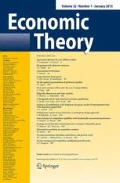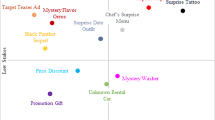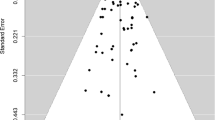Summary
This paper addresses the apparent conflict between the results of experiments on individual choice and judgement and the results of market experiments. Data are reported for experiments designed to analyze the effects of (a) economic incentives, repetition, feedback and information and (b) choice and valuation response modes on (c) subjects' decisions in paired market and nonmarket environments. Causes of divergent market and nonmarket behavior are identified in the context of the preference reversal phenomenon (PRP). Study of the PRP is extended to two types of market environments. The PRP is observed on the first repetition in a market setting (second price auction) with immediate feedback, both with and without financial incentives. However, after five repetitions of the auction, the subjects' bids are generally consistent with their choices and the asymmetry between the rates of predicted and unpredicted reversals disappears. An individual pricing task using the BDM mechanism yields similar results on the first repetition but results which differ from the second price auction on the fifth repetition. Choice tasks produce lower rates of reversals than do pricing tasks in both market and individual decision making settings.
Similar content being viewed by others
References
Allais, M.: Le compartement de l'homme rationnel devant le risque; critique des postulates et axioms de l'ecole americaine. Econometrica21, 503–46 (1953)
Beach, L., Phillips, L.: Subjective probability inferred from estimates and bets. J. Exp. Psychol.75, 354–59 (1967)
Beach, L., Wise, J.: Subjective probability revision and subsequent decisions. J. Exp. Psychol.81, 561–65 (1969)
Beach, L. et al.: Probability learning: response proportions and verbal estimates. J. Exp. Psychol.86, 165–70 (1970)
Becker, G., DeGroot, M., Marshak, J.: Measuring utility by a single-response sequential method. Behav. Sci.9, 226–32 (1964)
Berg, J., Dickhaut, J., O'Brien, J.: Preference reversal and arbitrage. In: Smith, V. (ed.) Research in experimental economics, vol. 3. Greenwich: JAI Press 1985
Bostic, R., Herrnstein, R., Luce, D.: The effect on the preference-reversal phenomenon of using choice indifference. J. Econ. Behav. Organiz.13, 193–222 (1990)
Braunstein, Y., Schotter, A.: Economic search: an experimental study. Econ. Inquiry19, 1–25 (1981)
Braunstein, Y., Schotter, A.: Labor market search: an experimental study. Econ. Inquiry20, 133–44 (1982)
Camerer, C.: Do biases in probability judgement matter in markets? Experimental evidence. Amer. Econ. Rev.77, 981–97 (1987)
Camerer, C.: Does the basketball market believe in the ‘hot hand’? Amer. Econ. Rev.79, 1257–61 (1989)
Camerer, C.: An experimental test of several generalized utility theories. J. Risk Uncert.2, 61–104 (1989)
Camerer, C.: The rationality of prices and volume in experimental markets. Organiz. Behav. Human Dec. Proc.51, 237–72 (1992)
Casey, J.: Reversal of the preference reversal phenomenon. Organiz. Behav. Human Dec. Proc.48, 221–51 (1991)
Chu, Y., Chu, R.: The subsidence of preference reversals in simplified and marketlike experimental settingsa note. Amer. Econ. Rev.80, 902–11 (1990)
Cox, J., Epstein, S.: Preference reversals without the independence axiom. Amer. Econ. Rev.79, 408–26 (1989)
Cox, J., Oaxaca, R.: Laboratory experiments with a finite horizon job-search model. J. Risk Uncert.2, 301–29 (1989)
Cox, J., Oaxaca, R.: Tests for a reservation wage effect. In Geweke, J. (ed.) Decision making under risk and uncertaintynew models and empirical findings. Dordrecht: Kluwer Academic Publishers 1992
Cox, J., Oaxaca, R.: Direct tests of the reservation wage property. Econ. J.102, 1423–32 (1992)
Cox, J., Smith, V., Walker, J.: Theory and individual behavior of first-price auctions. J. Risk Uncert.1, 61–99 (1988)
DuCharme, W.: Response bias explanation of conservative human inference. J. Exp. Psychol.85, 66–74 (1970)
Edwards, W.: Conservatism in human information processing. In: Kleinmuntz, B. (ed.) Formal representation of human judgement. New York 1968
Ellsberg, D.: Risk, ambiguity, and the savage axioms. Q. J. Econ.75, 643–69 (1961)
Fischhoff, B.: Hindsight not equal to foresightthe: effect of outcome knowledge on judgement under uncertainty. J. Exp. Psychol.1, 228–99 (1975)
Forsythe, R., Nelson, F., Neumann, G., Wright, J.: The Iowa presidential stock marketa field experiment. In: Isaac, M. (ed.). Research in experimental economics, vol. 4. Greenwich: JAI Press 1991
Forsythe, R., Palfrey, T., Plott, C.: Asset valuation in an experimental market. Econometrica50, 537–67 (1982)
Gigerenzer, G.: How to make cognitive illusions disappearbeyond ‘heuristics and biases’. Eur. Rev. Soc. Psychol.2, 83–115 (1991)
Gode, D., Sunder, S.: Allocative efficiency of markets with zero-intelligence tradersmarket as a partial substitute for individual rationality. J. Polit. Econ.101, 119–37 (1993)
Goldstein, W., Einhorn, H.: Expression theory and the preference reversal phenomena. Psychol. Rev.94, 236–54 (1987)
Grether, D.: Bayes rule as a descriptive modelthe representativeness heuristic. Q. J. Econ.95, 537–57 (1980)
Grether, D., Plott, C.: Economic theory of choice and the preference reversal phenomenon. Amer. Econ. Rev.69, 623–38 (1979)
Hamm, R.: The conditions of occurrence of the preference reversal phenomenon. Tech. Report, Center for Research on Judgement and Policy, University of Colorado, 1984
Holt, C.: Preference reversals and the independence axiom. Amer. Econ. Rev.76, 508–14 (1986)
Howells, W.: Uncertainty from internal and external sourcesa clear case of overconfidence. J. Exp. Psychol.89, 240–43 (1971)
Howells, W.: Compounding uncertainty from internal sources. J. Exp. Psychol.95, 6–13 (1972)
Irwin, J., McClelland, G., Schulze, W.: Hypothetical and real consequences in experimental auctions for insurance against low-probability risks. J. Behav. Dec. Making5, 107–116 (1992)
Isaac, M., Plott, C.: Price controls and the behavior of auction markets: an experimental examination. Amer. Econ. Rev.71, 448–49 (1981)
Kagel, J., Levin, D.: The winner's curse and public information in common value auctions. Amer. Econ. Rev.76, 894–920 (1986)
Kahneman, D., Tversky, A.: On the psychology of prediction. Psychol. Rev.80, 237–51 (1973)
Kahneman, D., Slovic, P., Tversky, A.: In: Judgement under uncertainty: heuristics and biases. Cambridge: Cambridge University Press 1982
Karni, E., Safra, Z.: ‘Preference reversal’ and the observability of preferences by experimental methods. Econometrica55, 675–85 (1987)
Lichtenstein, S., Slovic, P.: Reversals of preference between bids and choices in gambling decisions. J. Exp. Psychol.89, 46–55 (1971)
Lichtenstein, S., Slovic, P.: Response-induced reversals of preference in gamblingan extended replication in Las Vegas. J. Exp. Psychol.101, 16–20 (1973)
Lindman, H.: Inconsistent preferences among gambles. J. Exp. Psychol.89, 390–97 (1971)
Loomes, G., Starmer, C., Sugden, R.: Preference reversalinformation-processing effect of rational nontransitive choice. Econ. J. [Conf. Suppl.]99, 140–51 (1989)
Loomes, G., Starmer, C., Sugden, R.: Observing violation of transitivity by experimental methods. Econometrica59, 425–40 (1991)
Loomes, G., Sugden, R.: Regret theoryan alternative theory of rational choice under uncertainty. Econ. J.92, 805–24 (1982)
Loomes, G., Sugden, R.: A rationale for preference reversal. Amer. Econ. Rev.73, 428–32 (1983)
Machina, M.: Choice under uncertaintyproblems solved and unsolved. J. Econ. Perspect.1, 121–54 (1987)
Miller, R., Plott, C.: Product quality signaling in experimental markets. Econometrica53, 837–72 (1985)
Peterson, C., DuCharme, W., Edwards, W.: Sampling distribution and probability revisions. J. Exp. Psychol.76, 236–43 (1968)
Plott, C.: Rational choice in experimental markets. In: Hogarth, R., Reder, M. (eds.) Rational choice: the contrast between economics and psychology. Chicago: University of Chicago Press 1987
Plott, C., Miller, R., Smith, V.: Intertemporal competitive equilibriuman empirical study of speculation. Q. J. Econ.91, 599–624 (1977)
Plott, C., Sunder, S.: Efficiency of experimental security markets with inside information: an application of rational expectations models. J. Polit. Econ.90, 663–98 (1982)
Plott, C., Sunder, S.: Rational expectations and aggregation of diverse information in laboratory security markets. Econometrica56, 1085–118 (1988)
Schkade, D., Johnson, E.: Cognitive processes in preference reversals. Organiz. Behav. Human Perform.44, 203–31 (1989)
Scott, W. Jr., Fark, J., Podsakoff, P.: The effects of ‘intrinsic’ and ‘extrinsic’ reinforcement contingencies on task behavior. Organiz. Behav. Human Dec. Proc.41, 405–425 (1988)
Segal, U.: Does the preference reversal phenomenon necessarily contradict the independence axiom? Amer. Econ. Rev.78, 233–36 (1988)
Slovic, P., Lichtenstein, S.: Preference reversalsa broader perspective. Amer. Econ. Rev.73, 596–605 (1983)
Slovic, P., Lichtenstein, S.: The relative importance of probabilities and payoffs in risk-taking. J. Exp. Psychol. [Monog. Suppl. part 2]78, 1–18 (1968)
Smith, V.: Markets as economizers of information: experimental examination of the Hayek hypothesis. Econ. Inquiry20, 165–79 (1982)
Smith, V.: Microeconomic systems as an experimental science. Amer. Econ. Rev.72, 923–55 (1982)
Smith, V.: Experimental methods in the political economy of exchange. Science234, 167–73 (1986)
Tversky, A.: Intransitivity of preference. Psychol. Rev.76, 31–48 (1969)
Tversky, A., Kahneman, D.: Belief in the law of small numbers. Psychol. Bull.76, 105–10 (1971)
Tversky, A., Kahneman, D.: Judgement under uncertainty: heuristics and biases. Science185, 1124–131 (1974)
Tversky, A., Slovic, P., Kahneman, D.: The causes of preference reversal. Amer. Econ. Rev.80, 204–17 (1990)
Wright, W., Abdoul-Ezz, M.: Effects of extrinsic incentives on the quality of frequency assessments. Organiz. Behav. Human Dec. Pro.41, 143–52 (1988)
Author information
Authors and Affiliations
Additional information
We are grateful for financial support from the National Science Foundation (grant no. SES-8820552) and the California Institute of Technology. Research facilities were provided by the Economic Science Laboratory at the University of Arizona. Valuable computer programming was provided by Sean Coates and Shawn LaMaster. We thank Professor Jeffrey Dubin for his help in setting up the software for the generalized Tobit model, and Professors Joyce Berg, Graham Loomes, and Charles R. Plott for helpful comments.
Rights and permissions
About this article
Cite this article
Cox, J.C., Grether, D.M. The preference reversal phenomenon: Response mode, markets and incentives. Econ Theory 7, 381–405 (1996). https://doi.org/10.1007/BF01213657
Received:
Revised:
Issue Date:
DOI: https://doi.org/10.1007/BF01213657




